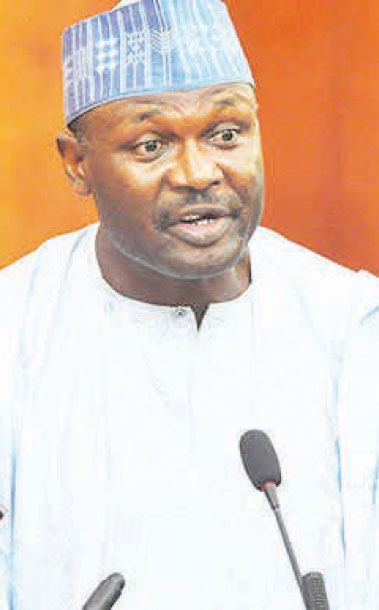With inconclusive governorship and legislative elections in some parts of the country, the ability of the current leadership of the Independent National Electoral Commission (INEC) in delivering credible polls to Nigerians has come under serious doubts, Assistant Editor (North), CHUKS EHIRIM, reports.
There are strong indications that President Muhammadu Buhari may bow to intense pressure on him, by leading members of his All Progressives Congress (APC) and other prominent Nigerians alike, to sack the recently appointed Chairman of the Independent National Electoral Commission (INEC), Professor Mahmood Yakubu, who has been in the saddle barely six months.
Failing a litmus test
Since he assumed duty as head of the election management body, Yakubu has presided over the conduct of three major elections – two governorship polls in Kogi and Bayelsa states as well as a legislative contest in Rivers State. Each of the exercises ended not only on inconclusive note but was marred by allegations of electoral malpractices.
It is even feared that the area council elections in the Federal Capital Territory (FCT) may also join the status of inconclusive elections that have characterised Yakubu’s INEC. The election, which was earlier scheduled to hold on March 19, was shifted to April 9. The excuse the INEC chairman gave for the shift was that the commission could not raise enough man power from the National Youth Service Corps (NYSC) members who are always used as ad hoc staff for elections.
The excuse however did not go down well with a section of the political class in Abuja. While some political parties hailed the shift, the Peoples Democratic Party (PDP) condemned it. Based on INEC’s poor outings in Kogi, Bayelsa and Rivers, there are already insinuations that the FCT area council election is already doomed to fail.
Political leaders from both the ruling APC and the opposition parties have been in constant condemnation of the conduct of elections by INEC since Yakubu came in. Some have even argued that the new helmsman has eroded all the gains INEC made under his predecessor, Professor Attahiru Jega.
Buhari admits lapses
Even President Buhari himself acknowledged the fact that his government recorded failure in giving Nigerians credible elections under the present leadership of INEC. Speaking at the National Executive Committee (NEC) meeting of his party in Abuja on Thursday, March 24, 2016, the President said: “I am afraid I did not succeed in the election in Kogi, Bayelsa, Rivers. I think that more Nigerians were killed or killed themselves in Rivers than in any particular state. At this stage of our political development, to remain brutal is shameful, and as a government, I promise we will do something by the next general election”.
Haunted by controversial past
But some APC leaders have even faulted the President in his choice of Yakubu as INEC Chairman, given Buhari’s anti-corruption mantra and Yakubu’s antecedents. One of the party’s leading figures who spoke to this reporter, on the condition that he should not be quoted, pointed out that given the circumstances that led to Professor Yakubu’s exit as the Executive Secretary of the Tertiary Education Trust Fund (TETFUND), he ought not to be considered for appointment into a sensitive position as INEC chairman, in the first instance.
The allegation was that Yakubu’s tenure in TETFUND was characterised by controversies bordering on how the resources of the organisation were managed.
In fact, the National Assembly is still probing allegations of corruption in that institution while Yakubu was in charge. When he was eased out of TETFUND, those who put him there were said to have fought back to ensure that he was returned to the office; but they lost the battle.
They, however, did not relent, as the don was later appointed as the Director of Finance at the National Conference organised by former President Goodluck Jonathan. Our source questioned the rationale behind his choice as INEC Chairman.
“If we want Nigerians to take us seriously on this anti-graft war, then Professor Yakubu should not be allowed to remain as INEC Chairman beyond today. Look at the man’s antecedents both at TETFUND and at the Confab. Does he fit into the bill of non-corrupt persons who should man our public institutions in this dispensation?” the source queried.
He, however, blamed those who recommended Yakubu to Buhari for the job. “I know there were some vested interests who lobbied for him to get the job; but such persons did not act in the public interest. The nation’s electoral system will continue to suffer as long as Professor Yakubu remains at the helm of affairs in INEC.”
The irony in the complaints against the INEC chairman is that they are essentially coming from the ruling APC which has lost six out of eight re-run elections since he assumed office. But apart from APC, others, especially the Peoples Democratic Party (PDP) chieftains, have also been complaining about the incompetence of the current INEC leadership.
Enter the Anambra debacle
One of the areas that have gathered a lot of controversies in recent times is the Supreme Court pronouncement on the Anambra State Senatorial Election. The Supreme Court, in its judgment given on January 29, 2016, had set aside the judgment of the Court of Appeal in CA/A/737/2014 and went further to hold that the Order of the Federal High Court in suit No. FHC/PH CS/213/2013, now suit No. FHC/AWK/CS/247/2013, is still subsisting.
It was the judgment of the Court of Appeal in CA/A/737/2014, which made INEC to substitute the names of Chris Ubah and Annie Okonkwo, who were nominated by the leadership of the PDP in the state headed by Ejike Oguebego, with Senators Andy Ubah and Stella Odua.
It is stated that the judgment and orders of the Federal High Court, delivered by Justice E. S. Chukwu, in FHC/ABJ/CS/854/2014, is still valid and subsisting. This includes “an order of perpetual injunction restraining the second respondent (INEC), its agents, servants, privies, assigns, officials whatsoever name they may be called from accepting or receiving any delegate list or nominated candidates that may emerge from the congresses set up by the 1st defendant for the People’s Democratic Party, Anambra State chapter, except those that emanate from the plaintiffs.”
In the Supreme Court judgment of January 29, delivered by Hon. Justice John Inyang Okoro (JSC) in the appeal No. SC. 37/2015 between Ejike Oguebego and another, vs Peoples Democratic Party and two others, the apex court ruled that “The Order of the Federal High Court in Suit No. PHC/PH/CS/2013, (now Suit No FHC/AWK/CS /247/2013 recognising the Ejike Oguebego-led executive committee of the Peoples Democratic Party, Anambra State chapter, is still subsisting until it is set aside by an order of court”.
Critics allege that rather than obey this order of the Supreme Court, the leadership of INEC embarked on the time-buying antics of filing a motion on notice, “seeking clarification” of certain portions of the judgment. The justice held, citing legal authorities, that “the court shall not review any judgment once given and delivered by it save to correct any clerical mistake or some error arising from any accidental slip or omission or to vary the judgment or order so as to give effect to its meaning or intention”.
He added that “a judgment or order shall not be varied when it correctly represents what the court decided nor shall the operative and substantive part of it be varied and a different form substituted.
“I must say that this court, in an application of this nature, is guided by the above rules. In view of the above provision of the rules of this court, can this court assume jurisdiction to hear the motion seeking clarification of our judgment? I do not think so. The motion is not seeking correction of any clerical mistake, or some error arising from any accidental slip or omission.”
The judge held that the court has powers to correct its own technical errors or slips of the pen, adding that such powers are exercisable both in criminal and civil proceedings.
INEC is yet to act on the matter conclusively.
In a fix
TheNiche learnt that the commission is dilly-dallying over this matter because of some vested interests outside it. A dependable source told us that a highly-placed politician from the Southern part of the country, who is the political godfather of both the INEC Chairman and one of the affected senators, has been influencing the non-compliance of INEC with the court ruling.
The politician, who is said to have played a major role in the rise of Yakubu in his stint with Federal Government institutions, also played a role in getting one of the senators into office and is working very hard not to allow the status quo altered.
Yakubu is thus said to have his hands tied on whether to obey the court order against the interest of his political godfather or to obey and lose his favour.













